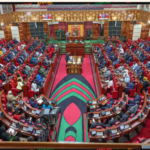Now Reading: Without proper checks, how can you be sure that the money being used by gambling companies is legitimate? Inside Kenya’s 2025 Anti-Money Laundering Bill
-
01
Without proper checks, how can you be sure that the money being used by gambling companies is legitimate? Inside Kenya’s 2025 Anti-Money Laundering Bill
Without proper checks, how can you be sure that the money being used by gambling companies is legitimate? Inside Kenya’s 2025 Anti-Money Laundering Bill

The betting industry, just like many other sectors, has faced the risk of being used by people looking to clean up illegally obtained money. This is a serious issue because it can damage the reputation of the industry and lead to criminal activities going unnoticed. Globally, regulators are paying closer attention to how money moves, and betting platforms haven’t been exempt from this scrutiny. This has created a need for stronger rules to ensure that betting remains a clean and fair form of entertainment.
This lack of clarity can breed mistrust among users and stakeholders. It also puts the entire industry at risk of being associated with criminal activities, potentially leading to stricter regulations and a negative public perception. We as an industry, want a transparent and trustworthy environment, right? The current situation, without specific and robust anti-money laundering measures tailored to betting, leaves loopholes that could be exploited. This uncertainty can stifle growth and innovation within the gaming sector.
Read Also: Ghana Gaming Commission Implements Tougher Betting Regulations
The good news is that the National Assembly passed the 2025 Anti-Money Laundering and Combating of Terrorism Financing Laws (Amendment) Bill. This new law specifically includes the betting industry, marking a significant step towards creating a safer and more transparent environment for everyone.
What’s Inside the 2025 Anti-Money Laundering Bill?
This bill brings several important changes aimed at preventing the betting industry from being used for money laundering, terrorism financing, and proliferation financing. Here’s a breakdown of what it generally contains:
- The bill gives the BCLB more power to regulate and supervise betting companies to ensure they are following anti-money laundering rules. This means they will have the authority to monitor betting activities, set guidelines, and take action against any suspicious behavior.
- The “Know Your Customer” (KYC) requirements, which help betting companies verify the identity of their customers and understand the source of their funds. This helps in identifying and preventing suspicious activities. For example, you might be asked to provide identification documents or proof of your income for large withdrawals.
- Betting companies will now have to closely monitor transactions for any unusual patterns or large sums of money that could indicate money laundering. They will be required to report any suspicious transactions to the relevant authorities. This might mean that if you suddenly start placing unusually large bets, the platform might flag your account for review.
- Betting companies will need to assess the money laundering risks associated with their operations and customers and implement measures that are appropriate to those risks. For instance, high-roller accounts or transactions from certain jurisdictions might be subjected to more scrutiny.
- This bill aims to bring Kenya’s anti-money laundering regulations in line with global standards set by bodies like the Financial Action Task Force (FATF). This is crucial for Kenya’s international financial reputation and can help in attracting foreign investment.
Read Also: Malawi Implements Strict Gambling Regulations to Safeguard Minors
What This Means for the Betting Industry:
For the betting industry, this bill signifies a move towards greater accountability and transparency. While it might mean some adjustments in how betting platforms operate, the long-term benefits are significant:
By implementing strong anti-money laundering measures, the betting industry can build greater trust among its users, partners, and regulators. This can enhance its reputation as a legitimate and responsible form of entertainment.
The new regulations will help in creating a more secure betting environment by deterring criminals from using these platforms to launder money. This protects both the industry and its customers.
A transparent and well-regulated industry is more likely to attract investment and experience sustainable growth in the long run. By addressing concerns about financial crime, the industry can create a more stable and predictable future.
The regulations will likely apply to all licensed betting operators, ensuring a level playing field and preventing unscrupulous actors from gaining an unfair advantage.
We believe the passing of the 2025 Anti-Money Laundering Bill is a positive development for the Kenyan betting industry. While there might be some initial hurdles in implementing these new regulations, the long-term benefits of increased transparency, security, and credibility far outweigh the challenges.
This move demonstrates a commitment to ensuring the integrity of the gaming sector and aligning it with international best practices.
Read Also: DR Congo Government Advances Gambling Sector Reforms to Enhance Revenue and Combat Financial Crimes



















